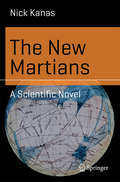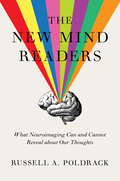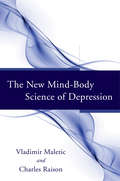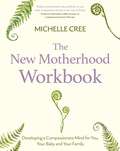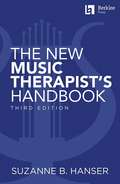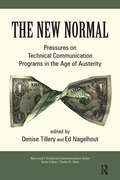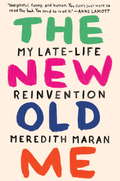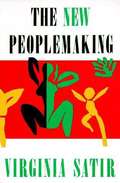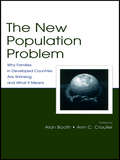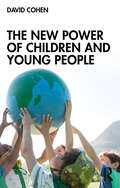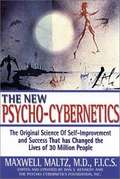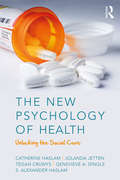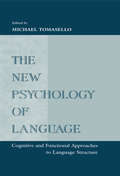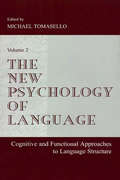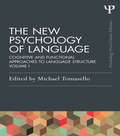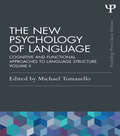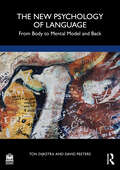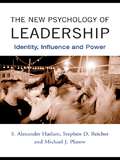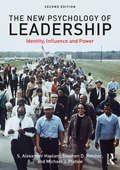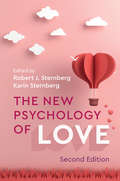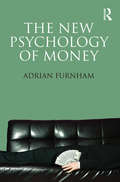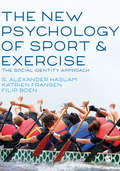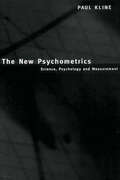- Table View
- List View
The New Martians: A Scientific Novel
by Nick KanasThe year is 2035, and the crew from the first expedition to Mars is returning to Earth. The crewmembers are anxious to get home, and ennui pervades the ship. The mood is broken by a series of mysterious events that jeopardize their safety. Someone or something is threatening the crew. Is it an alien being? A psychotic crewmember? A malfunctioning computer? The truth raises questions about the crewmembers' fate and that of the human race. In this novel, the intent is to show real psychological issues that could affect a crew returning from a long-duration mission to Mars. The storyline presents a mystery that keeps the reader guessing, yet the issues at stake are based on the findings from the author's research and other space-related work over the past 40+ years. The novel touches on actual plans being discussed for such an expedition as well as notions involving the search for Martian life and panspermia. The underlying science, in particular the psychological, psychiatric, and interpersonal elements, are introduced and discussed by the author in an extensive appendix.
The New Mind Readers: What Neuroimaging Can and Cannot Reveal about Our Thoughts
by Russell A. PoldrackA revealing insider’s account of the power—and limitations—of functional MRIThe ability to read minds has long been a fascination of science fiction, but revolutionary new brain-imaging methods are bringing it closer to scientific reality. The New Mind Readers provides a compelling look at the origins, development, and future of these extraordinary tools, revealing how they are increasingly being used to decode our thoughts and experiences—and how this raises sometimes troubling questions about their application in domains such as marketing, politics, and the law.Russell Poldrack takes readers on a journey of scientific discovery, telling the stories of the visionaries behind these breakthroughs. Along the way, he gives an insider’s perspective on what is perhaps the single most important technology in cognitive neuroscience today—functional magnetic resonance imaging, or fMRI, which is providing astonishing new insights into the contents and workings of the mind. He highlights both the amazing power and major limitations of these techniques and describes how applications outside the lab often exceed the bounds of responsible science. Poldrack also details the unique and sometimes disorienting experience of having his own brain scanned more than a hundred times as part of a landmark study of how human brain function changes over time.Written by one of the world’s leading pioneers in the field, The New Mind Readers cuts through the hype and misperceptions surrounding these emerging new methods, offering needed perspective on what they can and cannot do—and demonstrating how they can provide new answers to age-old questions about the nature of consciousness and what it means to be human.
The New Mind-Body Science of Depression
by Vladimir Maletic Charles RaisonThe scientific and therapeutic implications of a new way of understanding a common disease. Depression has often been studied, but this multifaceted disease remains far from understood. Here, leading researchers present a major new view of the disorder that synthesizes multiple lines of scientific evidence from neurobiology, mindfulness, and genetics. A comprehensive mind-body approach to understanding, evaluating, and treating this disease.
The New Motherhood Workbook: Developing a compassionate mind for you, your baby and your family (Compassion Focused Therapy)
by Michelle CreeLearn how to develop compassion for yourself and your familyHaving a baby can be a time of joy, but also one of anxiety and challenge. Although the period of time through pregnancy and infancy is relatively short, mothers have a sense of its importance and often work hard both mentally and physically to get it 'right'. This fascinating and practical self-help book will guide mothers-to-be and new mothers through the maze of parenting advice and confusing feelings that can arise.It explains how a brain state called 'the compassionate mind' has developed through evolution to be a particularly powerful way of helping us to get through the challenges of life with confidence, strength and steadiness.Using this workbook you will learn:· Powerful techniques for creating a sense of support, safeness and joy for you, your baby and your family in which you can all best flourish. · How to understand and attune to the mind of your child to create a secure attachment. · How to create the basis for a compassionate mind in your child so that they can navigate the challenges of life and make positive and healthy relationships.Filled with interactive exercises and practical skills, The New Motherhood Workbook will be a source of support through the perinatal period.THE COMPASSIONATE MIND APPROACH The self-help books in this series are based on Compassion Focused Therapy (CFT, developed by series editor Paul Gilbert). This brings together an understanding of how our mind can cause us difficulties but also provides us with a powerful solution in the shape of mindfulness and compassion. It teaches ways to stimulate the part of the brain connected with kindness, warmth, compassion and safeness, and to calm the part that makes us feel, anxious, angry, sad or depressed.
The New Motherhood Workbook: Developing a compassionate mind for you, your baby and your family (Compassion Focused Therapy)
by Michelle CreeLearn how to develop compassion for yourself and your familyHaving a baby can be a time of joy, but also one of anxiety and challenge. Although the period of time through pregnancy and infancy is relatively short, mothers have a sense of its importance and often work hard both mentally and physically to get it 'right'. This fascinating and practical self-help book will guide mothers-to-be and new mothers through the maze of parenting advice and confusing feelings that can arise.It explains how a brain state called 'the compassionate mind' has developed through evolution to be a particularly powerful way of helping us to get through the challenges of life with confidence, strength and steadiness.Using this workbook you will learn:· Powerful techniques for creating a sense of support, safeness and joy for you, your baby and your family in which you can all best flourish. · How to understand and attune to the mind of your child to create a secure attachment. · How to create the basis for a compassionate mind in your child so that they can navigate the challenges of life and make positive and healthy relationships.Filled with interactive exercises and practical skills, The New Motherhood Workbook will be a source of support through the perinatal period.THE COMPASSIONATE MIND APPROACH The self-help books in this series are based on Compassion Focused Therapy (CFT, developed by series editor Paul Gilbert). This brings together an understanding of how our mind can cause us difficulties but also provides us with a powerful solution in the shape of mindfulness and compassion. It teaches ways to stimulate the part of the brain connected with kindness, warmth, compassion and safeness, and to calm the part that makes us feel, anxious, angry, sad or depressed.
The New Music Therapist's Handbook
by Suzanne B. HanserLearn essential concepts and practices for providing music therapy. The New Music Therapist's Handbook has been an essential guide for music therapists worldwide since the 1990s. You will learn state of the art, data-driven approaches to providing care in a wide variety of therapeutic contexts. These practices are based on the most up-to-date science and experiences of thousands of patients and clients. Through detailed discussions of research and practice, case studies, strategies, and clinical approaches, you will learn how music therapy is a uniquely effective approach. In this third edition, Dr. Hanser's essential handbook has been updated and expanded to reflect the latest developments in healthcare and education. It includes valuable information for both students and professionals, particularly in meeting the competencies of the Board Certification for Music Therapy and standards of practice for the American Music Therapy Association.
The New Normal: Pressures on Technical Communication Programs in the Age of Austerity (Baywood's Technical Communications)
by Denise Tillery Ed NagelhoutAs colleges and universities across the country continue to deal with regular decreases in state funding, technical communication programs, in particular, are being forced to "do more with less." As budget cuts become the new normal, the long-term health of technical communication depends on our ability to evolve and adapt to an array of internal, external, and technological pressures. The New Normal: Pressures on Technical Communication Programs in the Age of Austerity explores the ways technical communication programs are responding to conditions of economic austerity and investigates how smaller programs, or programs situated in smaller institutions, use increasingly limited resources to meet the challenges of increased student demand, the responsibilities of teaching service courses effectively, the technological demands for online education, and the constant pressure to prepare our students appropriately for the ever-changing needs of the job market in technical communication. More specifically, the contributors to this collection are overtly conscious of the marginalized/peripheral status of technical communication programs within both small and large institutions. This awareness allows them to articulate specific ways that austerity has had a direct, and local, effect on a particular technical communication program and to describe short- and long-term strategies for creating sustainable futures for a technical communication program, despite cuts and marginalization.
The New Old Me: My Late-Life Reinvention
by Meredith MaranFor readers of Anne Lamott, Abigail Thomas, and Ayelet Waldman, a “lusty, kickass*” post-divorce memoir, one woman’s story of starting over at 60—in youth-obsessed, beauty-obsessed Hollywood.After the death of her best friend, the loss of her life’s savings, and the collapse of her once-happy marriage, Meredith Maran—whom Anne Lamott calls “insightful, funny, and human”—leaves her San Francisco freelance writer’s life for a 9-to-5 job in Los Angeles. Determined to rebuild not only her savings but herself while relishing the joys of life in La-La land, Maran writes “a poignant story, a funny story, a moving story, and above all an American story of what it means to be a woman of a certain age in our time” (Christina Baker Kline, number-one New York Times–bestselling author of Orphan Train).ADVANCE PRAISE for THE NEW OLD ME:“High time we had a book that celebrates becoming an elder! Meredith Maran writes of the difficulties of loss and change and aging, but makes it clear that getting on can be more interesting, more fun, and a lot more exciting than youth.”—Abigail Thomas, author of the New York Times bestseller What Comes Next and How to Like It “The New Old Me is a book I don’t just want to read—I need to read it. So does everyone else who’s getting older and wants to live fully, with immediacy and enjoyment, which is to say, everyone.”—Anne Lamott, author of the New York Times bestsellers Bird by Bird and Some Assembly Required “Meredith Maran is my new role model for getting older without getting old.”—Kate Christensen,author of the PEN/Faulkner award winner The Great Man*
The New Peoplemaking
by Virginia SatirThe New Peoplemaking expresses Satir's most evolved thoughts on self-worth, communication, family systems, and the ways in which people relate to one another. Drawn on Satir's lifetime of experience with thousands of families around the world, it is written in the engaging style for which she is famous. The New Peoplemaking is completely revised from the 1972 edition and enlarged by six new chapters that elaborate on the whole of life.
The New Population Problem: Why Families in Developed Countries Are Shrinking and What It Means (Penn State University Family Issues Symposia Series)
by Alan Booth Ann C. CrouterThis book is based on the presentations and discussions from a national symposium on "Creating the Next Generation: Social, Economic, and Psychological Processes Underlying Fertility in Developed Countries," held at the Pennsylvania State University in 2003. The papers address some of the antecedents and consequences of the recent steep declines in fertility in developed countries from different theoretical and disciplinary angles. While fertility rates are still high in some less-developed parts of the world, the new population problem with many countries in Europe, Asia, and North America is declining fertility. With fertility decline comes a reshaping of the population pyramid. The topic of fertility decline is interesting not only at the level of the individuals and couples, but also at the level of the societies that must come to grips with their long-term implications.Divided into four Parts, the text:*looks at contemporary trends in U.S. fertility, thus setting the stage for the entire volume;*discusses social and cultural values and attitudes;*analyzes fertility decisions in different countries; and*focuses on the possible long-term consequences of current fertility trends for individuals, families, and societies.
The New Power of Children and Young People
by David CohenIn a rapidly changing world, children have more of a voice than ever before. In The New Power of Children and Young People, David Cohen explores how this has happened, what the consequences might be and how we can best engage with our young people. David Cohen considers the social, political and psychological issues involved in children and young people’s influence, and how it impacts the balance of power between children and parents and other adults in their lives. It examines crucial topics including the role of high-profile young people such as Malala Yousafzai and Greta Thunberg; their knowledge of and anxieties around global issues such as climate change; children’s relationships with technology and social media; their changing relationships with parents and guardians; how children develop a sense of justice; sex and relationships; how children are depicted in TV and film; young people’s experience of education; and shines a light on their growing political confidence and engagement. Young people should be interested as well as parents, teachers, social workers, politicians and other key professionals involved in children and young people’s lives. This thought-provoking book offers insight to help us understand young people’s lives.
The New Psycho-cybernetics: The Original Science of Self-improvement and Success that has Changed the Lives of 30 Million People
by Maxwell MaltzAmazon; “With over 30 million copies sold since its original publication in 1960, Psycho-Cybernetics has been used by athletes, entrepreneurs, college students, and many others, to achieve life-changing goals--from losing weight to dramatically increasing their income--finding that success is not only possible but remarkably simple. Now updated to include present-day anecdotes and current personalities, The New Psycho-Cybernetics remains true to Dr. Maltz’s promise: ‘If you can remember, worry, or tie your shoe, you can succeed with Psycho-Cybernetics!’” In this book, Dr. Maltz discusses sound CBT and NLP techniques and provides exercises to help his readers develop positive self-images and overcome their anxious and depressive thoughts and feelings. The authors give the definitions of words, references for further reading, and places to go to obtain more psycho-cybernetic assistance.
The New Psychology of Health: Unlocking the Social Cure
by Jolanda Jetten Alex Haslam Catherine Haslam Tegan Cruwys Genevieve DingleWhy do people who are more socially connected live longer and have better health than those who are socially isolated? Why are social ties at least as good for your health as not smoking, having a good diet, and taking regular exercise? Why is treatment more effective when there is an alliance between therapist and client? Until now, researchers and practitioners have lacked a strong theoretical foundation for answering such questions. This ground-breaking book fills this gap by showing how social identity processes are key to understanding and effectively managing a broad range of health-related problems. Integrating a wealth of evidence that the authors and colleagues around the world have built up over the last decade, The New Psychology of Health provides a powerful framework for reconceptualising the psychological dimensions of a range of conditions – including stress, trauma, ageing, depression, addiction, eating behaviour, brain injury, and pain. Alongside reviews of current approaches to these various issues, each chapter provides an in-depth analysis of the ways in which theory and practice can be enriched by attention to social identity processes. Here the authors show not only how an array of social and structural factors shape health outcomes through their impact on group life, but also how this analysis can be harnessed to promote the delivery of ‘social cures’ in a range of fields. This is a must-have volume for service providers, practitioners, students, and researchers working in a wide range of disciplines and fields, and will also be essential reading for anyone whose goal it is to improve the health and well-being of people and communities in their care.
The New Psychology of Language: Cognitive and Functional Approaches To Language Structure, Volume I (Psychology Press And Routledge Classic Editions Ser.)
by Michael TomaselloThis book, which gathers in one place the theories of 10 leading cognitive and functional linguists, represents a new approach that may define the next era in the history of psychology: It promises to give psychologists a new appreciation of what this variety of linguistics can offer their study of language and communication. In addition, it provides cognitive-functional linguists new models for presenting their work to audiences outside the boundaries of traditional linguistics. Thus, it serves as an excellent text for courses in psycholinguistics, and appeal to students and researchers in cognitive science and functional linguistics.
The New Psychology of Language: Cognitive and Functional Approaches To Language Structure, Volume II (Psychology Press And Routledge Classic Editions Ser.)
by Tomasello MichaelFrom the point of view of psychology and cognitive science, much of modern linguistics is too formal and mathematical to be of much use. The newly emerging approaches to language termed, "Functional and Cognitive Linguistics," however, are much less formally oriented. Instead, functional and cognitive approaches to language structure are typically couched in terms already familiar to cognitive scientists: perception, attention, conceptualization, meaning, symbols, categories, schemas, perspectives, discourse context, social interaction, and communicative goals. The account of human linguistic competence emerging from this new paradigm should be extremely useful to scientists studying how human beings (not formal devices) comprehend, produce, and acquire natural languages. The current volume brings together 10 of the most important linguists in cognitive and functional linguistics whose work is often not easily available to those outside the field. In original contributions, each of these scholars focuses on an important aspect of human linguistic competence, with a special eye to readers who are not professional linguists. Of special importance to all of the contributions are the cognitive and social interactional processes that constitute human linguistic communication. The book is of special interest to psychologists, cognitive scientists, psycholinguists, and developmental psycholinguists, in addition to linguists taking a more psychological approach to language.
The New Psychology of Language: Cognitive and Functional Approaches to Language Structure, Volume I (Psychology Press & Routledge Classic Editions)
by Michael TomaselloFrom the point of view of psychology and cognitive science, much of modern linguistics is too formal and mathematical to be of much use. The New Psychology of Language volumes broke new ground by introducing functional and cognitive approaches to language structure in terms already familiar to psychologists, thus defining the next era in the scientific study of language.The Classic Edition volumes re-introduce some of the most important cognitive and functional linguists working in the field. They include a new introduction by Michael Tomasello in which he reviews what has changed since the volumes first published and highlights the fundamental insights of the original authors. The New Psychology of Language volumes are a must-read for anyone interested in understanding how cognitive and functional linguistics has become the thriving perspective on the scientific study of language that it is today.
The New Psychology of Language: Cognitive and Functional Approaches to Language Structure, Volume II (Psychology Press & Routledge Classic Editions)
by Michael TomaselloFrom the point of view of psychology and cognitive science, much of modern linguistics is too formal and mathematical to be of much use. The New Psychology of Language volumes broke new ground by introducing functional and cognitive approaches to language structure in terms already familiar to psychologists, thus defining the next era in the scientific study of language.The Classic Edition volumes re-introduce some of the most important cognitive and functional linguists working in the field. They include a new introduction by Michael Tomasello in which he reviews what has changed since the volumes were first published and highlights the fundamental insights of the original authors. The New Psychology of Language volumes are a must-read for anyone interested in understanding how cognitive and functional linguistics has become the thriving perspective on the scientific study of language that it is today.
The New Psychology of Language: From Body to Mental Model and Back
by Ton Dijkstra David PeetersThis illuminating book offers an up-to-date introduction to the psychology of language, exploring aspects of language processing that have previously not been given centre stage such as the role of body and brain, social aspects of language use, and mental models. The New Psychology of Language presents an overarching theoretical account called the Language User Framework for discussing a wide variety of core language activities. How do we understand speech in conversations? How do we read books? How do we convert our thoughts into bodily signals (speech, gestures, facial expressions) when we speak? What happens in the mind and brain when we have mastered two or more languages? All these aspects of language use are discussed at the level of words and sentences, as well as text and discourse. Language is considered as an embodied, embedded, incremental cognitive activity aiming at the construction and communication of rich and dynamic mental models. Discussion boxes highlight controversies in the field; case studies and practical exercises provide insight into everyday examples; illustrations represent important models of language processing; and key findings come along with clear and concise chapter summaries. Special attention is paid to research techniques for investigating the psychology of language. This accessible book is essential reading for students in disciplines such as psychology, cognitive science and neuroscience, artificial intelligence, biology, the language and communication sciences, and media studies. It is also a useful resource for a lay audience with an interest in language and communication.
The New Psychology of Leadership: Identity, Influence and Power
by S. Alexander Haslam Michael J. Platow Stephen D. ReicherWinner of the University of San Diego Outstanding Leadership Book Award 2012! Shortlisted for the British Psychological Society Book Award 2011! Shortlisted for the CMI (Chartered Management Institute) Management Book of the Year Award 2011–2012! According to John Adair, the most important word in the leader's vocabulary is "we" and the least important word is "I". But if this is true, it raises one important question: why do psychological analyses of leadership always focus on the leader as an individual – as the great "I"? One answer is that theorists and practitioners have never properly understood the psychology of "we-ness". This book fills this gap by presenting a new psychology of leadership that is the result of two decades of research inspired by social identity and self-categorization theories. The book argues that to succeed, leaders need to create, champion, and embed a group identity in order to cultivate an understanding of 'us' of which they themselves are representative. It also shows how, by doing this, they can make a material difference to the groups, organizations, and societies that they lead. ? Written in an accessible and engaging style, the book examines a range of central theoretical and practical issues, including the nature of group identity, the basis of authority and legitimacy, the dynamics of justice and fairness, the determinants of followership and charisma, and the practice and politics of leadership. The book will appeal to academics, practitioners and students in social and organizational psychology, sociology, political science and anyone interested in leadership, influence and power.
The New Psychology of Leadership: Identity, Influence and Power
by S. Alexander Haslam Michael J. Platow Stephen D. ReicherThis ground-breaking book provides a refreshing introduction to the field of leadership and is jam-packed with theoretical and practical insights derived from a wealth of applied scientific research conducted by the authors and their colleagues around the world over the last three decades. It starts from the premise that leadership is never just about leaders. Instead it is about leaders and followers who are joined together as members of a social group that provides them with a sense of shared social identity — a sense of ‘us-ness’. In these terms, leadership is understood as the process through which leaders work with followers to create, represent, advance, and embed this sense of shared social identity. The new edition of this award-winning book presents a wealth of evidence from historical, organizational, political and sporting contexts to provide an expanded exploration of these processes of identity leadership in action. In particular, it builds upon the success of the first edition by examining the operation of identity leadership in contemporary society and fleshing out practical answers to key organizational and institutional challenges. Drawing on real-world examples and rich data sources, this book will appeal to academics, researchers and students of psychology, business and management, as well as to practitioners, policy makers and anyone interested in the workings of leadership, influence and power.
The New Psychology of Love
by Robert J. Sternberg Karin SternbergThis is a much-needed development from the first edition that provides an update on the theory and research on love by world-renowned scientific experts. It explores love from a diverse range of standpoints: social-psychological, evolutionary, neuropsychological, clinical, cultural, and even political. It considers questions such as: how men and women differ in their love, what makes us susceptible to jealousy and envy in relationships, how love differs across various cultures? As the neuropsychological basis of love is examined, this study showcases what attracts people to one another, why love has developed the way it has over time, and what evolutionary purpose it serves. It also analyses why and when love relationships both succeed and fail, which means readers will be rewarded with a better understanding of their own relationships and those of others, as well as what can be done to build a lasting, loving relationship.
The New Psychology of Money
by Adrian FurnhamThe New Psychology of Money is an accessible and engrossing analysis of our psychological relationship to money in all its forms. Comprehensive and insightful, Adrian Furnham explores the role that money plays in a range of contexts, from the family to the high street, and asks whether the relationship is always a healthy one. Discussing how money influences what we think, what we say, and how we behave in a range of situations, the book places the dynamics of high finance and credit card culture in context with traditional attitudes towards wealth across a range of cultures, as well as how the concept of money has developed historically. The book is split into four sections: Understanding Money. What are our attitudes to money, and how does nationality, history and religion mediate those attitudes? Money in the Home How do we grow up with money, and what role does it play within the family? What role does gender play, and can we lose control in dealing with money? Money at Work. Are we really motivated by money at work? And what methods do retailers use to persuade us to part with our money? Money in Everyday Life. How do we balance the need to create more money for ourselves through investments with the desire to make charitable contributions, or give money to friends and family? How has the e-revolution changed our relationship to money? Radically updated from its original publication in 1998, The New Psychology of Money is a timely and fascinating book on the psychological impact of an aspect of daily life we generally take for granted. It will be of interest to all students of psychology, economics and business and management, but also anyone who takes an interest in the world around them.
The New Psychology of Sport and Exercise: The Social Identity Approach
by S Alexander Haslam Katrien Fransen Filip Boen′The Roger Federer, the Steffi Graf, the Usain Bolt of all books about the psychology of sport, packed with insight and wisdom’ - Brian Viner, Sports writer and author of Pelé, Ali, Lillee, and Me This is the first textbook to explore and explain the contribution of social groups and social identity to all aspects of sports and exercise — from leadership, motivation and communication to mental health, teamwork, and fan behaviour. In the context of increasing recognition of the importance of group processes for athletic performance, engagement in exercise and the business of sport, this book offers a new way of understanding, researching and practicing sport and exercise psychology Written by an international team of researchers at the cutting edge of efforts to apply social identity principles to the world of sport and exercise, this will be an essential resource for students, teachers and practitioners who are keen to be at the forefront of thinking and practice.
The New Psychology of Sport and Exercise: The Social Identity Approach
by S Alexander Haslam Katrien Fransen Filip Boen′The Roger Federer, the Steffi Graf, the Usain Bolt of all books about the psychology of sport, packed with insight and wisdom’ - Brian Viner, Sports writer and author of Pelé, Ali, Lillee, and Me This is the first textbook to explore and explain the contribution of social groups and social identity to all aspects of sports and exercise — from leadership, motivation and communication to mental health, teamwork, and fan behaviour. In the context of increasing recognition of the importance of group processes for athletic performance, engagement in exercise and the business of sport, this book offers a new way of understanding, researching and practicing sport and exercise psychology Written by an international team of researchers at the cutting edge of efforts to apply social identity principles to the world of sport and exercise, this will be an essential resource for students, teachers and practitioners who are keen to be at the forefront of thinking and practice.
The New Psychometrics: Science, Psychology and Measurement
by Paul KlineMany psychological factors are little more than statistical descriptions of particular sets of data and have no real significance. Paul Kline uses his long and extensive knowledge of psychological measurement to argue that truly scientific forms of measurement could be developed to create a new psychometrics. This would transform the basis of psychology and change it from a social science to a pure science.
